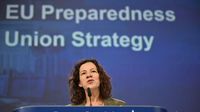The European Union (EU) is urging its citizens to prepare for potential crises by assembling emergency supplies to ensure self-sufficiency for at least 72 hours. This recommendation is part of the Union Preparedness Strategy, presented by the European Commission on March 26, 2025, in response to growing geopolitical tensions, climate change, and the increasing frequency of natural disasters.
According to the strategy, developed based on a report by former Finnish President Sauli Niinistö, the EU aims to bolster its readiness against various threats, including military aggression, cyberattacks, and other emergencies that could disrupt essential services. The plan outlines 30 key actions that member states are encouraged to implement to enhance their crisis preparedness.
One of the central aspects of the strategy is the recommendation for each EU member state to create a survival kit containing essential items such as water, food, basic medicines, flashlights, and important documents stored in waterproof cases. European Commissioner for Crisis Management Hadja Lahbib emphasized the importance of being strategically autonomous during emergencies, stating, "We will support member states in preparing what is called a resilience kit, so that all citizens are ready to resist and be strategically autonomous for at least 72 hours."
This initiative comes at a time when citizens are increasingly concerned about their safety. Recent Eurobarometer data revealed that 36% of EU citizens are worried about the bloc's security and defense capabilities. The EU's strategy not only addresses immediate preparedness but also emphasizes the need for a cultural shift towards integrated preparedness across all EU policies.
As part of the strategy, the EU plans to establish a digital platform that will provide information on risks and available options, such as shelters. This platform aims to enhance communication and coordination among member states during crises. The Commission also proposes to coordinate strategic reserves of essential goods, including medicines, food, and energy resources, to ensure rapid access during emergencies.
Moreover, the EU is looking to strengthen civil-military cooperation by conducting joint exercises and training programs. These efforts will involve various stakeholders, including armed forces, civil protection agencies, police, and health workers, to ensure a coordinated response to crises.
In her remarks, Ursula von der Leyen, the President of the European Commission, highlighted the necessity of a proactive approach to crisis management. She stated, "The new realities require a new level of preparation in Europe. Our citizens, our member states, and our businesses need the right tools to prevent crises and react swiftly when disaster strikes."
The strategy also emphasizes the importance of educating citizens about preparedness. The Commission intends to propose an annual EU Preparedness Day, which would serve as a platform for raising awareness about the importance of being prepared for emergencies. Furthermore, it encourages member states to incorporate lessons on crisis preparedness into school curricula.
France, for instance, has already established guidelines for a 72-hour survival kit, which includes items such as portable radios, spare batteries, warm clothing, and multi-tools. This initiative aims to harmonize preparedness measures across the 27 EU member states, ensuring that all citizens are equipped to handle various emergencies.
In addition to personal preparedness, the strategy outlines the need for increased stocks of critical equipment and supplies, including vaccines and medical countermeasures. The EU aims to create a comprehensive assessment of risks and threats at the European level, facilitating better prevention and response strategies for natural disasters and hybrid threats.
To further enhance its crisis management capabilities, the EU plans to establish a Crisis Coordination Center and develop a crisis dashboard for decision-makers. This will improve the integration of existing crisis management structures within the EU and facilitate better coordination among member states during emergencies.
Overall, the EU's new preparedness strategy reflects a growing recognition of the need for a comprehensive approach to crisis management in an increasingly unpredictable world. By encouraging citizens to prepare for emergencies and enhancing cooperation among member states, the EU aims to build a more resilient and secure Europe capable of facing the challenges of the 21st century.









